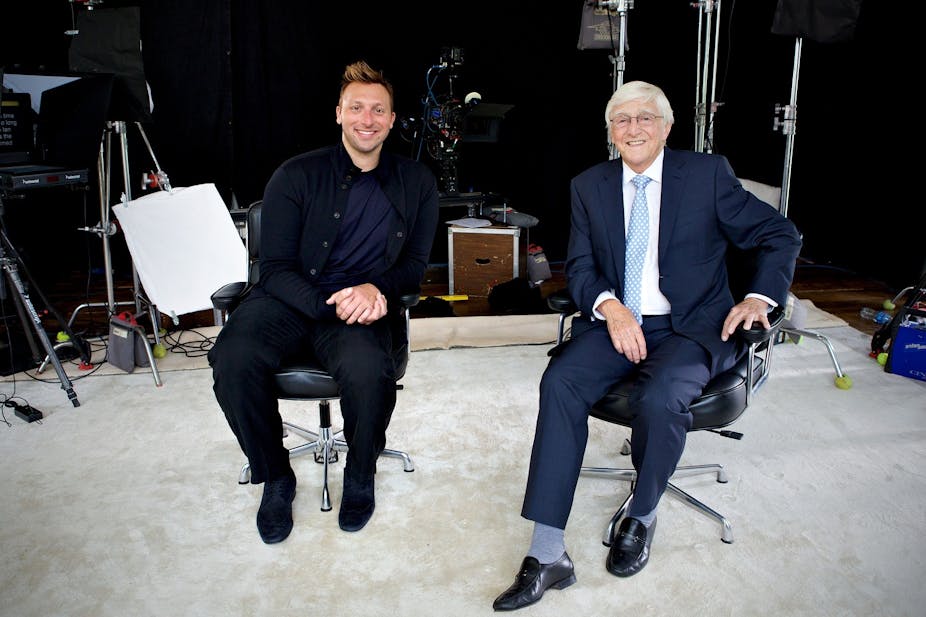Ian Thorpe coming out as gay during an interview with Michael Parkinson last night was both the most ordinary of stories and the most extraordinary. It also showed how deeply homophobia is ingrained in Australian society.
It was ordinary because, over the last 20 years, my colleagues and I have documented stories just like it. And it was extraordinary because Thorpe felt he was unable to come out earlier despite his high profile.
There’s no question that homophobia is a health hazard and one that we’ve been slow to address. The depression and despair so powerfully described by Thorpe prevents young people from reaching out for help, out of fear of losing their attachment to family and friends, which they feel may be conditional on ignorance about their sexuality.
An ordinary story
In two recent surveys, high levels of depression and suicide ideation were found to be part of the history of gay people of all ages and very much related to their shared history of everyday abuse and violence.
Gay men, in particular, are exposed to violence and the messages that accompany it as part of a rigorous policing of masculinity that begins in schools and may continue throughout their lives.
Research shows harsh and neglectful school environments, where homophobic abuse flourishes and large numbers of same-sex attracted young people experience anxiety, depression and suicide ideation. In fact, suicide contemplation rises in exact proportion to the amount of abuse suffered.
Move all this into the hyper-masculine sporting arena and no wonder Ian Thorpe felt part of his essential self had to be hidden to ensure his safety, perhaps even annihilated to prevent public disgrace.
He would have been under no illusion that the constant media badgering for confirmation of his sexuality would not have been to celebrate it, but rather to create a scandal.
An extraordinary story
But this is also the most extraordinary of stories because Ian Thorpe offered the Australian public so much, in the highly revered area of sporting accomplishment. Surely, he, of all people, should have felt the Australian people would forgive him this one thing.
I use the word forgive deliberately because despite the somewhat ho-hum reaction to Thorpe’s revelation in the press and social media today, it’s still difficult to escape the prevailing notion in Australia that being gay is bad news, that it is evidence of being somehow lesser.
Consider the related story of football commentator Brian Taylor’s casual description of Harry Taylor as “a big poofter”, which is at least as big a story this morning as Thorpe’s coming out.
His rap on the knuckles (being sent home to watch the football rather than to call it) is a sign that these days we understand it’s not okay to publicly berate gay people. Still, it was only a little rap, because most Australians also assume he didn’t mean to hurt anyone.
But hurt he would have, as gay people everywhere would have seen it as confirmation of this society’s deeply-held belief that nobody wants to be gay. Thorpe can be forgiven for not reading such remarks any differently.
Looking up
Today, the landscape for same-sex attracted young people is not nearly as bleak as it was in Thorpe’s youth. Social media has thrown closeted young people a lifeline that puts them in touch anonymously with others having, and working through similar doubts and fears.
It creates a rich virtual world to counteract the loneliness and hostility of their physical communities and helps them feel safe until they’re old enough to risk exposure.
Government funded anti-homophobia programs in schools are having a demonstrable impact on the mental health of young people who are not straight. But these initiatives are fragile and under constant attack.
Ian Thorpe’s revelation will have an impact. Hundreds of young people will relate to his story and draw on it to shape their own destinies. It certainly matters that he has a high profile and that the world didn’t end when he spoke up.
Just as he has inspired a generation of young swimmers to go swifter, higher, stronger so will his openness inspire other young people to work towards an authentic self.
The challenge for us as a society is to move beyond the big-hearted, open-minded response of “it doesn’t matter to me if he’s gay, he’s still a great sportsman” to a response of genuine celebration. By coming out, Thorpe has given more of himself as a gift to the Australian public, and shown leadership he was afraid to embrace in the past.
Nothing will land in the trophy room to recognise this achievement, but lives will be saved. And it will be step towards Australia becoming a nation where that matters.
Do openly gay public figures like Ian Thorpe matter? They sure do

